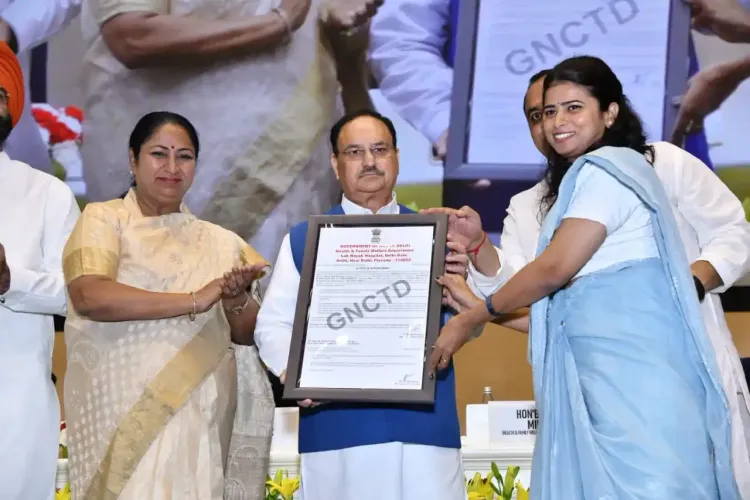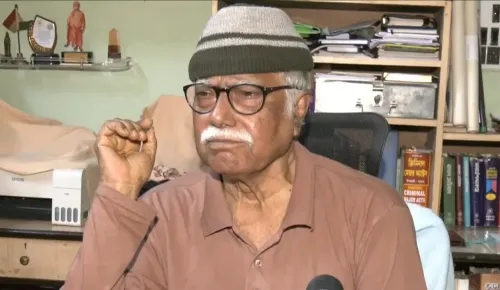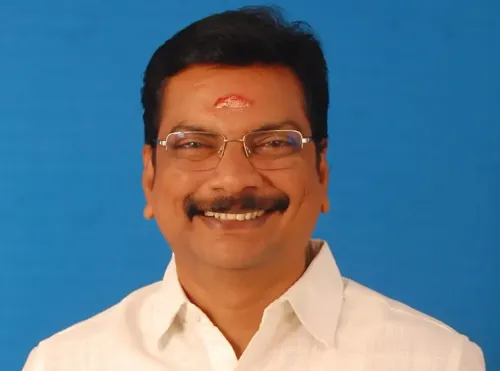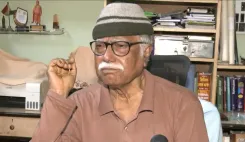Will the Centre Achieve the Goal of 1,100 Ayushman Arogya Mandirs in Delhi by March 31, 2026?

Synopsis
Key Takeaways
- 1,100 Ayushman Arogya Mandirs to be established by March 2026.
- Budget allocation: Rs 1,700 crore.
- 4 lakh Ayushman Cards issued, including 2 lakh Vay Vandana Cards.
- Focus on comprehensive healthcare: preventive, promotive, curative, rehabilitative, and palliative.
- Significant reduction in maternal and infant mortality rates.
New Delhi, July 6 (NationPress) Health Minister JP Nadda called upon all parties involved to commit fully to the implementation of PM-ABHIM (Ayushman Bharat Health Infrastructure Mission) in Delhi, aiming to establish 1,100 Ayushman Arogya Mandirs by March 31, 2026, with a budget allocation of Rs 1,700 crore.
The minister distributed appointment letters to nursing officers and paramedical personnel in Delhi and initiated the launch of Ayushman Bharat Registration Vans, alongside Chief Minister Rekha Gupta at Vigyan Bhawan.
"This is a significant moment as our nursing officers and paramedical staff are receiving appointment letters for the first time in 15 years. The Delhi government is dedicated to enhancing the healthcare system by hiring a specialized workforce," Nadda stated.
He emphasized that Delhi experiences the highest healthcare burden as patients from all over the country come for treatment, highlighting previous neglect in the healthcare system.
The Minister praised the current Delhi government's efforts to bolster healthcare infrastructure and advance the Ayushman Bharat-Pradhan Mantri Jan Aarogya Yojana (AB-PMJAY) and PM-ABHIM.
"Under Prime Minister Narendra Modi's guidance, Ayushman Vay Vandana was introduced to provide healthcare for senior citizens over 70. The Delhi government is committed to ensuring the right to lifelong health with dignity under Vay Vandana," the Health Minister remarked.
So far, 4 lakh Ayushman Cards have been distributed in Delhi, with 2 lakh cards issued under Vay Vandana.
He urged all stakeholders to diligently work on PM-ABHIM in Delhi and achieve the target of launching 1,100 Ayushman Arogya Mandirs by the deadline.
"In 1997, the Health Policy was primarily focused on curative care, but under PM Modi's visionary leadership, the New Health Policy 2017 was introduced, emphasizing a holistic approach—preventive, promotive, curative, rehabilitative, and palliative care, particularly for the elderly," the minister stated.
He pointed out that "special attention is being given to preventive healthcare, with initiatives for early diagnosis of various diseases. We are prioritizing screenings for individuals over 30 and working to curb disease spread through early intervention."
To date, 18 crore screenings for hypertension, 17 crore screenings for diabetes, 15 crore screenings for oral cancer, 7.5 crore screenings for breast cancer, and 4.5 crore screenings for cervical cancer have been conducted," Nadda confirmed.
The Maternal Mortality Ratio (MMR) has decreased from 130 to 88 per lakh live births, while the Infant Mortality Rate (IMR) fell from 39 to 26. The Under-Five Mortality Rate (U5MR) has seen a 42% decline, compared to a global average decrease of 14%. The neonatal mortality rate has also dropped by 40%, while the global average is 11%.
Nadda added that "TB incidence has decreased by 17.7%, more than double the global reduction rate of 8.3%, as reported by the WHO Global TB Report 2024."
India had only 7 All India Institute of Medical Sciences (AIIMS) until 2014, but now 20 AIIMS are operational.
"The number of medical colleges has risen from 387 in 2014 to 780, and the total number of medical seats has increased from 51,000 to 1,18,000, aiming for an additional 75,000 seats over the next five years," the Health Minister highlighted.
On this occasion, CM Gupta mentioned: "So far, 4 lakh Ayushman cards have been issued under the Ayushman Arogya Yojana, including 2 lakh Vay Vandana Cards for senior citizens in Delhi. A total of 2,258 individuals have already received medical treatment, and 108 hospitals in Delhi are now empaneled under the scheme."
She also noted that "every hospital in Delhi now has a Jan Aushadhi Kendra, ensuring access to medicines for all." She emphasized the Delhi government's commitment to promoting transparency in the healthcare system while preventing corruption.









